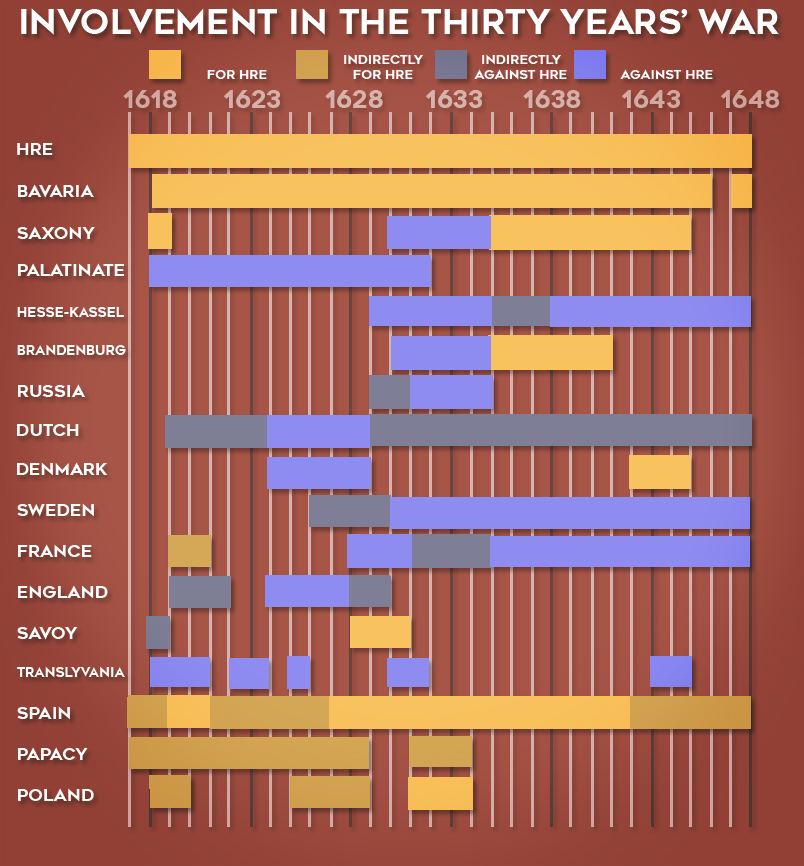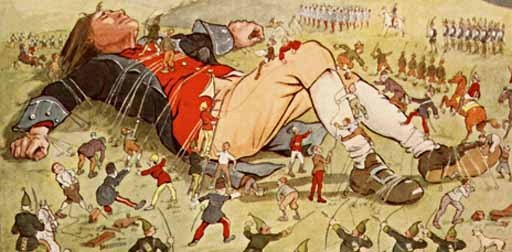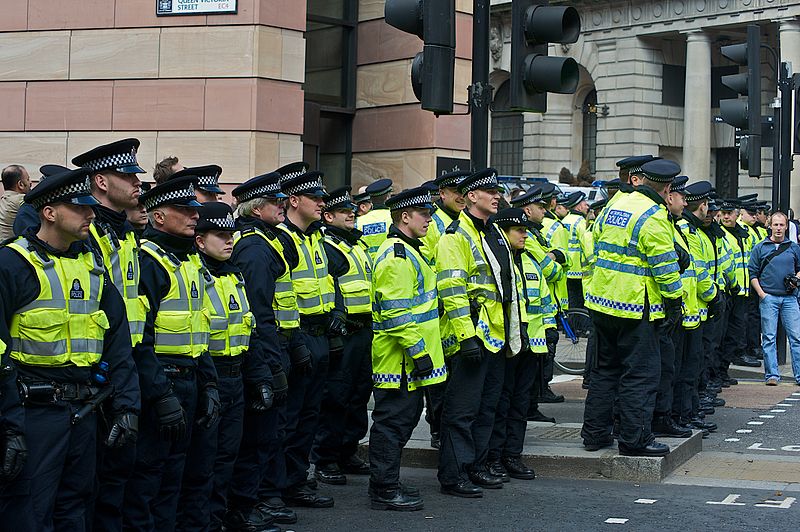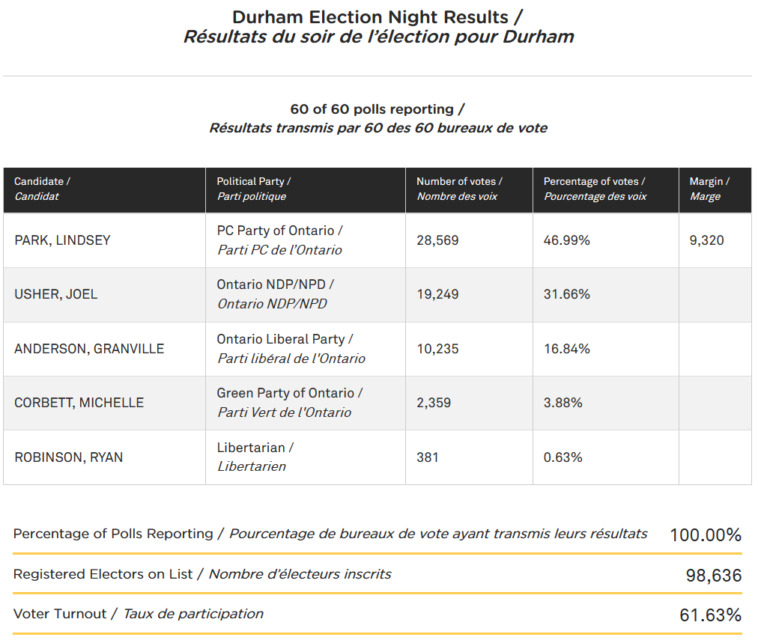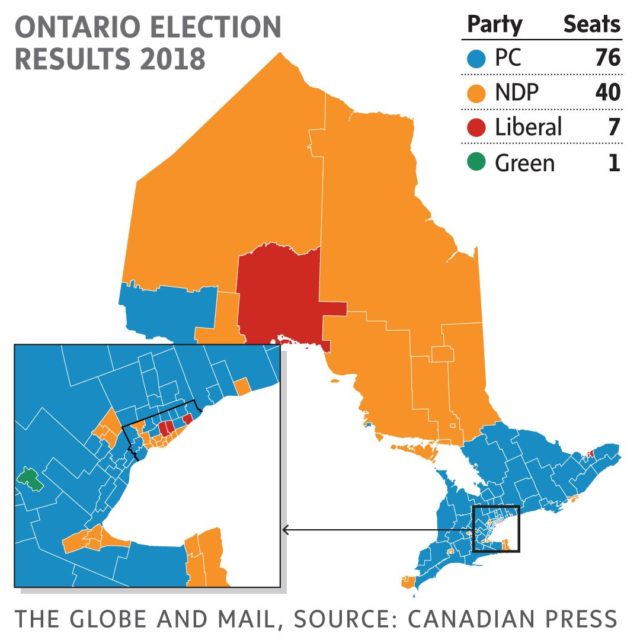Feature History
Published on 12 Nov 2016Hello and welcome to Feature History, featuring religious conflict, tragic war, and a really nifty collaboration with Jabzy.
3 Minute History – German Peasant’s War
https://www.youtube.com/watch?v=zeQVAUmyLks
June 11, 2018
Feature History – Thirty Years’ War
QotD: Gandhi as filmic hagiography
Gandhi, therefore, the film, this paid political advertisement for the government of India, is organized around three axes: (1) Anti-racism — all men are equal regardless of race, color, creed, etc.; (2) anti-colonialism, which in present terms translates as support for the Third World, including, most eminently, India; (3) nonviolence, presented as an absolutist pacifism. There are other, secondary precepts and subheadings. Gandhi is portrayed as the quintessence of tolerance (“I am a Hindu and a Muslim and a Christian and a Jew”), of basic friendliness to Britain (“The British have been with us for a long time and when they leave we want them to leave as friends”), of devotion to his wife and family. His vow of chastity is represented as something selfless and holy, rather like the celibacy of the Catholic clergy. But, above all, Gandhi’s life and teachings are presented as having great import for us today. We must learn from Gandhi.
I propose to demonstrate that the film grotesquely distorts both Gandhi’s life and character to the point that it is nothing more than a pious fraud, and a fraud of the most egregious kind. Hackneyed Indian falsehoods such as that “the British keep trying to break India up” (as if Britain didn’t give India a unity it had never enjoyed in history), or that the British created Indian poverty (a poverty which had not only existed since time immemorial but had been considered holy), almost pass unnoticed in the tide of adulation for our fictional saint. Gandhi, admittedly, being a devout Hindu, was far more self-contradictory than most public men. Sanskrit scholars tell me that flat self-contradiction is even considered an element of “Sanskrit rhetoric.” Perhaps it is thought to show profundity.
Richard Grenier, “The Gandhi Nobody Knows”, Commentary, 1983-03-01.
June 10, 2018
The Landings At Cape Helles 1915 I THE GREAT WAR On The Road
The Great War
Published on 9 Jun 2018Thank you to Mr Ali Serim for making this trip possible.
Indy and our guide Can Balcioglu explore the southern tip of Gallipoli where the British Army landed in April 1915.
Why the Canadian media (and the Laurentian Elite) misjudge Trump
Ted Campbell provides a thumbnail sketch of Donald Trump and suggests why the Canadian establishment finds him so hard to understand (and to work with):
In the view of Professors Bradbury and Leuprecht Canada and all of the US’ competitors are falling into Trump’s trap and the WTO ~ and global fair trade ~ will be the chief victim because, from President Trump’s perspective it is better that we all sink into poverty as long as the US remains top dog.
OK, what do we actually know about Donald Trump? What drives his policy choices?
I’m going to engage in a bit of ‘pop psychology’ and very personal speculation to try to clarify my own thoughts about President Trump as he prepares to meet, in just a few hours, with the G7 in Canada.
Is he stupid? No, not really … perhaps not “well read” as, say, most presidents from George Washington and Thomas Jefferson through to George H.W. Bush and Barack Obama were, but he’s not a stupid man. Is he intellectually lazy? I believe so … I think that explains why he is reported to dislike sitting through briefings and so on; he seems to want to follow his own instincts and cut through all the details, especially those which might not support his instinctive preferred course of action.
Is he a racist? The available evidence says “No,” he’s not. Is he Islamophobic? Not likely, I think. Is he a white supremacist? Not that, either, in my view, but it may be closer to his ‘basic instincts.’ He is, I suspect, something a kin to the Nativists who sprung up in mid 19th century America. He is, I believe, suspicious of everyone who is not a born and bred American. It not a racist or religious thing, it is simple nationalism of a rather narrow and nasty sort.
I think he is also, or wishes to be, an isolationist; I suspect he actively detests the World Trade Organization, the United Nations, the World Court, the International Monetary Fund, the Organization of American States, NATO and, possibly, even bilateral even NORAD because he sees each as an attempt by foreigners to entangle America and tie its hands. He is said to be less opposed to bilateral deals in which the US is, inevitably, the major partner but dislikes multi-lateral deals wherein American can be outnumbered and outvoted by others. he seems not to care who the “others” are … foreigners are foreigners, none are friends.
He is, as I have said before, an instinctive man; he makes up his mind quickly ~ although he may change it, by a full 180°, in hours or days ~ based on the evidence he wants to hear and believe, and I suspect that his instinctive reaction to the world is the America is like a modern day, national Gulliver, marooned in a hostile, greedy world and tied down by agreements and treaties and institutions created by little people …
… and then forced to abide by the little peoples’ rules.
[…]
His view of “winning,” it seems to me, owes more to Conan the Barbarian than to Adam Smith or Andrew Carnegie. Thus, I think Time has it about right … he wants to be an absolute monarch.
In fact, I think he shares Prime Minister Justin Trudeau’s “admiration” for China’s “basic dictatorship, which “allows them to turn their economy around on a dime.” Since I don’t think he, Trump, or Trudeau for that matter, knows much about economics I can only conclude that he admires Xi Jinping’s ability to exercise dictatorial power and throw his perceived enemies in jail on a whim.
That, I suspect, is President Trump’s “basic instinct:” he wants to be the absolute monarch of whatever enterprise with which he happens to be involved ~ property development, repeated bankruptcy proceedings, reality TV shows and now the US presidency. I’m guessing that we might have Donald Trump in the White House until 2020 … his view of America in the world, as Gulliver, is shared by many millions of his fellow citizens and the US Democrats seem, at best, incoherent in policy terms.
D-Day – Lies – Extra History
Extra Credits
Published on 1 Aug 2017D-Day is too vast and important a topic to be completely covered by four short videos, but we hope our series offered some new insights into the massive effort that went into the Normandy beach landings. James Portnow and Richard Cutland, Wargaming’s Head of Military Relations, take some time to chat about some more important D-Day stories.
QotD: Typing with a foreign accent
To sound generally foreign, omit elisions and contractions normally used by native speakers. Type “I do not think I have the time” rather than “I don’t think I have time”.
To sound German, put commas in places that do not correspond to speech pauses in English. “I do not know, how he could have believed that.”
To sound Russian, omit definite or indefinite articles. “No, you cannot have cheeseburger.”
To sound like a speaker of Hindi or Urdu or one of the related languages, emit wordy run-on sentences that begin with “Esteemed sir”, like: “Esteemed sir, I would be grateful if you could direct me towards a good book on Python because I am attempting to learn programming.”
Understand, none of these errors actually interferes with comprehension. I’ve found that these second-language speakers are often more worried about the quality of their English than they need to be.
Eric S. Raymond, “How to Type with a Foreign Accent”, Armed and Dangerous, 2009-06-12.
June 9, 2018
The (formerly) friendly Bobby – “The police have been alienating their erstwhile natural friends for some time”
Patrick West on the long decline in public trust for British police:
In Britain, there have traditionally been two sections of society who dislike the police. One type are radicals – or pseudo-radicals, as epitomised by the capitalist-run store Lush and Rik from The Young Ones – who object to the forces of law’n’order on anarcho-libertarian grounds. The police for them are ‘pigs’. The other type are the working class, or sections of it, who object to the police on account of them poking their nose into private matters that don’t concern them. The police for them have historically been ‘the filth’.
Yet the police are now widely disliked beyond those two demographics. These days, even conservatives and the respectable middle class don’t like the rozzers. A story beyond the hoo-ha over Lush and its anti-police ads might help to explain why.
This year there has been a litany of reports about rape cases collapsing owing to police failing to investigate evidence that would have exonerated the defendants. And this week it was revealed that 47 rape and sexual-assault cases in England and Wales were halted between January and mid-February because evidence was withheld from defence lawyers.
This is not entirely the police’s fault. They have been under political pressure from lobby groups obsessed with attaining rape conviction quotas – as if justice was about achieving statistical targets, rather than punishing guilty individuals and letting innocent individuals go free. As the Daily Telegraph, a newspaper that should be a natural friend of the police, put it: ‘It is hard not to conclude that under pressure to increase conviction rates, the police and prosecutors simply withheld evidence that would help the defence, in order to make a successful prosecution more likely.’
The police have been alienating their erstwhile natural friends for some time. This first became evident at the end of the last century, with the jailing of the Norfolk farmer Tony Martin for shooting dead a burglar who had broken into his home. The consequent outrage in the conservative press stemmed from a belief that the police were now more concerned with the human rights of criminals than with crimes against private property, in this case.
Thermopylae – The Hellenic Alliance – Extra History – #1
Extra Credits
Published on 7 Jun 2018A small handful of Grecian city-states have come together to stand off against the invading Persians at Thermopylae. At this fateful mountain pass, Greece will discover its identity as a nation.
The Battle of Thermopylae is one of the most significant events in the ancient world — and also one of the least understood.
Brought to you by Total War: Arena! Use the code HOPLITE for extra goodies:
https://totalwararena.net/join/4064_EN1…
Various comments on the Ontario election
Once the voting was underway, I briefly checked my Facebook feed and, as expected, saw a lot of declared support for the NDP (even among those who normally lean Liberal), a few of the more outspoken Conservatives fighting their corner, but others I think of as Conservative-leaning were generally being very quiet. I didn’t bother with my Twitter feed, as relatively few of the people I follow are from Ontario, and the same for my Gab feed (Twitter biases as far left as Gab tends to the far right).
When I went in to vote (I had a Libertarian candidate in my riding), I asked the poll clerk if there had been any ballot refusals and she said “there’d been a few”. The preliminary results shown on the Elections Ontario site for my riding:
The Globe and Mail sent a tweet showing the overall shape of the PC victory:
David Warren commented on the election results:
My Chief Texas Correspondent leaps naturally upon the result of yesterday’s Ontario provincial election, in which our governing Liberals were annihilated. He sees this as a conventional “shift to the Right,” in Merican party terms, and celebrates it as such.
To which I reply: that the moronic city voters went not Right but over to the NDPee, which promised more spending than even the Liberals could imagine, and various grand new welfare schemes. (They are a zoological garden of various activist nutjobs.) Our outgoing premier’s personal charmlessness factored into the result. The winning Doug Ford is a total clown, and the media will have him for breakfast and snacks, yet for one brief glorious moment the Leftoids are in disarray. Ford is no Trump, though he might be able to match your esteemed President in straightforward vulgarity. He cannot have the fondest clew what he will do with the mess he has inherited, now that he is in power. He will have to betray that half of his constituency to which he promised the opposite of what he pledged to the other half, with unstudied vagueness. His caucus will be crawling with Suburban Saracens and other multicultural eccentrics — not the old solid Tory phalanx of white, Presbo-Methodist, rural hicks. Alas, though the ride may be wild, it won’t be fun to watch.
At BlogTO, Lauren O’Neil gathers a lot of Toronto-centric Twitter comments (not surprisingly, most are not complementary toward the Premier-elect (who, I’m informed we should more accurately be calling the Premier-designate instead)).
Kathy Shaidle posted on Facebook:
Am I relieved? You bet. But: Remember how close the polls were. The NDP got a lot of votes, and while our system means that the PCs won, the “popular” vote still shows how many leftoids there are in the province. And who else noticed that Doug’s “enthusiastic” official opening lines — “What a response. This is incredible.” — was scripted, and delivered with the stilted conviction of an Ed Wood stock player? On that note, I’ve seen less wooden Chippendale highboys…
D-Day – IV: The Atlantic Wall – Extra History
Extra Credits
Published on 29 Jun 2017The Germans had established a secure barrier against the Allied invasion of France – or so they believed, until the D-Day landings in Normandy caught them by surprise and the Atlantic Wall quickly fell apart.
QotD: Thomas Jefferson on Epicurus and Plato
As you say of yourself, I too am an Epicurean. I consider the genuine (not the imputed) doctrines of Epicurus as containing everything rational in moral philosophy which Greece and Rome have left us… Their great crime [the Stoics] was in their calumnies of Epicurus and misrepresentations of his doctrines; in which we lament to see the candid character of Cicero engaging as an accomplice. Diffuse, vapid, rhetorical, but enchanting. His prototype Plato, eloquent as himself, dealing out mysticisms incomprehensible to the human mind, has been deified by certain sects usurping the name of Christians; because, in his foggy conceptions, they found a basis of impenetrable darkness whereon to rear fabrications as delirious, of their own invention.
Thomas Jefferson, Letter to William Short, 1819-10-31.
June 8, 2018
The British political scene has all the horrific fascination of a slow-motion car crash
Colby Cosh says that anyone who claims to be shocked and appalled at the Ontario political mess need only glance across the pond to put things into proper perspective:
The one thing everyone seems to agree upon about Ontario’s provincial election is that it has been all kind of horrid, strange and exhausting; if there is another thing they agree upon, it is that Ontario politics will probably continue to be horrid, strange and exhausting for a while even when it’s over. I have one word for these people: Brexit. Try following U.K. politics for a while in the era of British secession from the European Union. You will scurry, shrieking, back to Queen’s Park soon enough.
The Brexit drama is a mesmerizing blend of jargon and impotence, frustration and confusion; it is a vivisection of democracy from which Britain cannot avert its gaze. In Ontario you still have distinguishable political parties: in Britain now, familiar entities have been altogether dissolved into underlying tendencies, shades and conspiracies. So-and-so is a “soft Brexiter.” How soft? Oh, not as soft as Mr. Whatnot, but distinctly softer than Miss How-Do-You-Do. Mysterious verbal puzzles — do you favour the “single market” or the “internal market”? — become theatres of struggle.
A bonus of Brexit-watching for us is that, over the past six months or so, you have often been able to get the brief neurochemical pop that Canadians all receive when Canada is mentioned abroad. The Canada-EU free-trade deal CETA, which you may remember being signed in October 2016 after some obscure trouble with Walloons, has turned out to be an important anchoring concept in the Brexit debate. CETA is the European Union’s most liberal and comprehensive trade deal with an offshore non-member — and that is just what Britain voted to become.
Advocates of a “hard” Brexit, with no judicial, bureaucratic or fiscal ties to the continent, began pointing to CETA as a readymade model for Britain-EU relations almost before the ink was dry. Problem: CETA broadly allows free movement of goods between Canada and Europe, but services are not included. Britain doesn’t make much physical stuff anymore, and it quit digging coal; it depends especially heavily on providing financial services to the world.
The Battle of Belleau Wood Begins I THE GREAT WAR Week 202
The Great War
Published on 7 Jun 2018The German Army is still threatening Paris and the situation for the Allies looks dire. Reluctantly, General Pershing agrees to put some of the American troops into action at Belleau Wood and Château-Thierry.
The spiritual and aesthetic brutality of Brutalist architecture
In City Journal, Catesby Leigh looks at (and shudders at) some of the best-known examples of Brutalist architecture in the UK:
World War II left Britain in urgent need of rebuilding. The Blitz destroyed 200,000 homes and left another quarter-million uninhabitable. In the severely overcrowded urban slums, often blighted by industrial pollution, families lived without indoor plumbing, and they shared outdoor privies with neighbors. Others found shelter in temporary prefabricated homes produced by the aviation industry. In 1946, the government legislated the creation of new towns that, along with extensions of existing ones, would eventually be home to more than 2 million Britons. Aside from the new towns, a multitude of urban renewal and greenfield-development schemes emerged during the economically vigorous 1950s and 1960s. Housing “estates” erected by city and other local councils, mainly for lower-income residents, sprang up at a vertiginous rate, along with new office buildings, civic centers, shopping centers, parking garages, schools, hospitals, factories, and university buildings. Some 1.5 million prewar homes were demolished in the three decades following the war. Old urban centers were transformed: “Post-war Birmingham rebuilt itself in austere raw concrete, like Kuwait and Hanover and Manila,” Christopher Beanland enthuses in Concrete Concept: Brutalist Buildings Around the World. But by the late 1960s, it was obvious that most Englishmen weren’t keen on the idea of Birmingham looking like Kuwait and Hanover and Manila.
[…]
Many of the buildings that Harwood’s book covers make you wonder whether it is really about architecture at all. Consider Park Hill (1961), a huge council-housing estate containing nearly 1,000 duplexes and single-level flats that partially replaced a demolished slum overlooking downtown Sheffield — a crime-ridden precinct that, for all its problems, had housed a resilient community. Laid out as four long, interconnected slabs inflected so as to form an utterly antiurban, vermiculated footprint, Park Hill owed an enormous debt to the Unité d’habitation. At every third story, it featured elevated open-air “streets” or “decks” — the Corbusian fetish of the day — that ran indoors and out, connecting the slabs. As at the Unité, the imagery was nakedly industrial, with the apartments stashed in a “bottle-rack” grid of concrete that soon assumed a depressingly drab tincture and also proved prone to spalling. A ruthless rationalism likewise asserted itself in the level height maintained throughout the complex, which ranged from four to 13 stories, despite the irregular, sloping site. Park Hill was less a work of architecture than a huge, strange contraption inflicted on the urban skyline. Visual amenity, such as it was, came in the form of soft-hued brick within the concrete grid.
As with many postwar housing projects, Park Hill offered practical amenities that residents had never before enjoyed: indoor plumbing, hot water, mechanical heating, even a sophisticated garbage-disposal system. Harwood mentions that, Britain’s many council-housing catastrophes notwithstanding, Park Hill “stood firm.” This is not true. By 1979, less than 20 years after its completion, Park Hill was an urban basket case — riddled with graffiti, terrorized by hooligans, afflicted with irruptions of black mold and the terrible stench resulting from waste-disposal blockages. Deserted decks and stairways provided criminals with multiple escape routes.
[…]
Local journalist Peter Tuffrey’s Sheffield Flats, Park Hill and Hyde Park: Hope, Eyesore, Heritage — whose title might seem to play ironically off Harwood’s but for the fact that the book appeared two years earlier — allows us to study a map and old photographs of the slum that Park Hill and Hyde Park supplanted. What we see are blocks, courts, and alleys teeming with row houses and low-rise tenements — streetscapes displaying a human scale, much solid construction, and considerable dereliction, all to be swept away by the desolation of the Corbusian superblocks.
Harwood doesn’t trouble herself with the Hulme Crescents (1972), another assemblage of concrete slabs on the vermiculated, “streets-in-the-sky” plan that rose from the blank slate of a demolished Manchester working-class district where 90,000 people once lived — “the human engine-room of the Industrial Revolution,” as Lynsey Hanley calls it in her largely autobiographical and often engrossing Estates: An Intimate History. The Crescents, designed to house more than 13,000, were conceived in emulation of Bath, the gorgeous Georgian city. Things didn’t work out that way.
“Almost immediately, the estate’s infrastructure began to suffer from the same problems that beset Park Hill and Broadwater Farm [a troubled north London estate]: leaky roof membranes, infestations of vermin and insects, uncontrollable damp, deserted walkways, and an endemic feeling of isolation,” Hanley notes. “The flats were so expensive to warm that many tenants never turned the central heating on, and communal areas were so difficult to maintain that the [city] council could not cope. When a small child died after falling off the top-floor ‘access deck’ of one of the Crescents in 1974, families decamped to the outskirts, belatedly following the rest of old Hulme.” The Crescents’ descent into chaos did make it possible for an anarchic punk scene to flourish in an upper-level hangout known as The Kitchen. The party ended with the estate’s demolition during the 1990s.
[…]
Still, the folly of concentrating lower-income populations in tall buildings eludes her, just as it eluded the Tory government that, in 1956, introduced hugely generous subsidies for the construction of high-rises, relative to row houses and semidetached houses. Not only are tall buildings much more expensive to build and maintain than houses; they were not even essential to achieving the residential densities that postwar planners sought. Tall buildings are highly artificial and complex structures housing temperamental machines, like elevators, that require a heightened degree of maintenance, often by highly paid technicians rather than handymen with toolboxes and stepladders, as Hanley observes. Tall buildings also require an elevated degree of social discipline, as well as security features like intercom systems, closed-circuit TV, and doormen or concierges. The tower blocks and high-rise slabs at the Barbican Estate, the carefully developed, elaborately landscaped, intensely picturesque Brutalist “bankers’ commune” in the City of London, have been very successful. The appropriate synecdoche for the Barbican’s low-end counterparts, however, might well be a broken-down elevator littered with trash, defaced by graffiti, and reeking of urine.
D Day – III: La Résistance – Extra History
Extra Credits
Published on 20 Jun 2017Although the French government surrendered to the German invasion, French people rose up and formed resistance groups to take their country back. Charles de Gaulle and his Free French took advantage of these independent movements to help organize actions that would greatly aid the Allied landings at Normandy.

